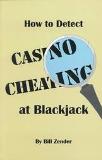
How to Detect Casino Cheating at Blackjack
Zender's How to Detect Casino Cheating at Blackjack is Recommended Reading
Over the years, Bill Zender, former Nevada Gaming Control Agent and Director of Casino Operations at the Aladdin, has been widely acknowledged as one of the most thoughtful and progressive casino Nick Christenson is widely regarded as one of the best gambling book reviewers publishing today. He is a contributor for Poker Player magazine, and has published in Full-Tilt and Gambling Times. He is also the editor of the very funny 'Casino Death Watch,' which chronicles the comings and goings of casinos in Las Vegas. He is an avid poker and blackjack player. Nick's website is www.jetcafe.org/~npc/ insiders in the gaming business today. He has quite literally written the books on Pai Gow Poker and Blackjack card counting from the casino's point of view. His training methods and careful mathematical analysis of casino games gave the Aladdin one of the highest hold percentages of any Nevada casino. In his latest book, Zender has tackled a taboo topic, that of the cheating of players by casinos in the game of Blackjack. It is unusual enough that someone has written a book on this controversial topic, but for it to be written by a casino insider is truly astounding, but the public is the beneficiary of Zender's considerable expertise on the subject.
Nick Christenson is widely regarded as one of the best gambling book reviewers publishing today. He is a contributor for Poker Player magazine, and has published in Full-Tilt and Gambling Times. He is also the editor of the very funny 'Casino Death Watch,' which chronicles the comings and goings of casinos in Las Vegas. He is an avid poker and blackjack player. Nick's website is www.jetcafe.org/~npc/ insiders in the gaming business today. He has quite literally written the books on Pai Gow Poker and Blackjack card counting from the casino's point of view. His training methods and careful mathematical analysis of casino games gave the Aladdin one of the highest hold percentages of any Nevada casino. In his latest book, Zender has tackled a taboo topic, that of the cheating of players by casinos in the game of Blackjack. It is unusual enough that someone has written a book on this controversial topic, but for it to be written by a casino insider is truly astounding, but the public is the beneficiary of Zender's considerable expertise on the subject.
Having been a casino operator, responsible for the day to day management of everything that happens on the casino floor, a gaming control agent, responsible for investigating allegations of casino cheating, and a Blackjack card counter, having made his living for a while on the players' side of the table, Zender is uniquely qualified to tackle this topic. In his book, Zender draws on real situations he encountered during his tenure as a casino employee, actual cases he worked on as a gaming control agent, and has access to the first hand accounts of events as happened to some of the most respected names in Blackjack. All of this data, along with a light, but well considered narrative, make this book useful as well as entertaining.
The first couple of chapters focus on the history of cheating at Blackjack and the rumors that surround the industry. Zender goes to great lengths to emphasize that casino cheating, especially in the large, established gambling jurisdictions, is an extremely rare event. However, with the proliferation of legalized gambling, and the fact that careful gambling control has not spread quite so rapidly, some cheating is always a possibility.
Zender is well aware that in the hands of a true expert, casino cheating via card manipulation is undetectable to those who do not possess those skills. However, most of the rest of the book discusses how these techniques are employed, why they give the house an unfair advantage, how they may be detected if they are performed sloppily, and some warning signs to look for that indicate that maybe these techniques are being used against you. All of the techniques Blackjack players should fear most, cooler decks, stripped decks, dealing seconds, switching hole cards, and, most controversially, preferential shuffling, and more are all discussed here, and with authority.
Finally, the book concludes with a summation, a glossary for those unfamiliar with some of the terms used in the book, a bibliography that enumerates various sources Zender cited, and an index. In his summation, Zender again emphasizes that cheating by casinos, especially in established gaming jurisdictions, is rare, but not out of the question.
One may well ask, "If casino cheating is so rare, why should I bother buying this book and understanding these techniques?" This is a valid question, but I believe there is a good answer. In large part, the value of the book is in the confidence it can bring to help the recreational or professional gambler feel assured that they're not being cheated. In some sense, an understanding of the topics in the book can be thought of as an insurance policy, not so much against cheating, but against being victimized by the uncertainty of whether one is being cheated or not. This may not sound like much, but for the serious player, I believe it is well worth the cost of admission.
The second good reason to buy and read this book is that it is entertaining. I enjoyed reading Zender's accounts of cheating as he has witnessed it, and even if I hadn't learned anything from the book, I would still have found it worth my time from the standpoint of my pure enjoyment. At twenty dollars, it's also reasonably priced, although at under 200 pages, it isn't very long, which is both a plus and a minus. I think most serious blackjack players will both enjoy reading this book and get more than enough out of it to justify the time and money spent on it.
